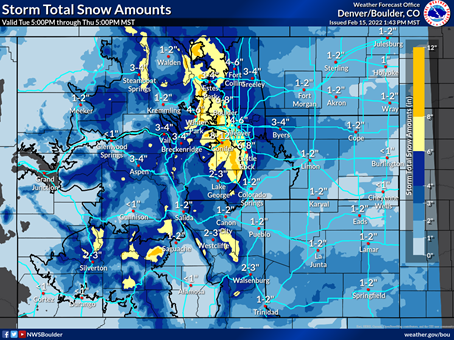Storm Alert: Wednesday afternoon rush-hour snow storm on its way to the Front Range
Travel Advisory
DENVER ― The Colorado Department of Transportation advises travelers to be prepared for another round of winter weather over the next few days. The biggest impact is expected to be the Wednesday evening commute when snow is forecast to fall over an inch an hour throughout the Denver region and along the Front Range. Motorists are urged to avoid travel during the brunt of the storm beginning Wednesday afternoon through the night.
Driving conditions could be very hazardous along the I-70 mountain corridor at Floyd Hill and the I-25 corridor at Monument south of Castle Rock.
CDOT crews will be fully deployed, working continuously through the storm. Crews will focus first on the interstates and other major state-maintained roadways with the highest traffic volumes. Once the storm subsides, crews will plow other state routes. Even with plows out, with heavy snowfall rates, roads will be slushy at first then snow covered.
Motorists often believe that CDOT maintains local and residential roads, including neighborhood streets. However, cities and counties are responsible for local and residential roads—not CDOT.
What motorists should know:
- Monitor weather conditions and plan ahead - avoid or limit driving during the worst of the storm which is expected to be Wednesday afternoon and evening.
- Monitor road conditions by visiting COtrip.org.
- When out on the roads, have the appropriate tires for the weather with at least 3/16 inch of tread.
- Take it slow and leave plenty of space behind the vehicle ahead.
- Leave plenty of space behind plows.
- Most crashes are caused by driving too fast, following too closely and not having the appropriate tires for the weather.
Bow to the plow:
It is illegal to pass a snowplow when it is operating in a tandem formation with one or more snowplows. Tandem plowing staggers multiple plows to cover all lanes and clear the entire roadway in one sweep. It is extremely dangerous for motorists to try and pass plows in this formation because you could encounter white-out conditions and ridges of snow between lanes.
In general, don’t pass plows because they are pushing snow, slush, rocks and other debris. That debris could damage your car and temporarily obstruct your view.
Don’t crowd plows because they drop de-icer. Make sure to stay back three to four car lengths. If you are too close, the de-icer could hit your car. Also, a plow might need to make a sudden stop, so make sure you have plenty of room to do the same!

Chain and Traction Laws
When weather conditions warrant, CDOT will activate the Traction Law. If weather conditions deteriorate, CDOT will activate Chain Laws for passenger and commercial vehicles. Motorists will be alerted to an active Traction or Chain Law by highway signage, COtrip.org and traffic/roadway condition alerts. For more information on the Traction Law and Passenger Vehicle Chain Law requirements, visit codot.gov/travel/winter-driving/tractionlaw. For more information on the Commercial Vehicle Chain Law requirements, visit codot.gov/travel/colorado-chain-law. To learn more and view helpful tips for winter driving, visit winter.codot.gov.
Know Before You Go
Travelers are urged to “know before you go.” Gather information about weather forecasts and anticipated travel impacts and current road conditions prior to hitting the road. CDOT resources include:
- Road conditions and travel information website: COtrip.org
- Winter driving information: codot.gov/travel/winter-driving
- Connect with us on social media: Twitter @coloradodot and Facebook facebook.com/coloradodot
About Winter Wise
CDOT’s Winter Wise campaign focuses on education, tools and resources to help keep drivers safe on Colorado’s winter roads. To learn more and view helpful tips for winter driving, visit winter.codot.gov. For specific information about I-70 and other highway travel conditions, motorists can call 511 or check COtrip.org. Additionally, drivers can check Twitter for up-to-date travel information via @ColoradoDOT. For more detailed information about the Traction and Passenger Vehicle Safety Laws, snowplow laws, safety stats and frequently asked questions, visit winter.codot.gov.
